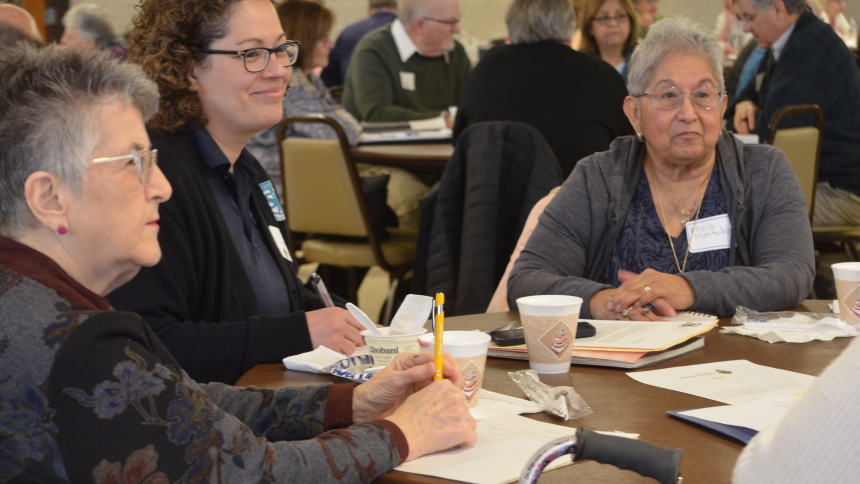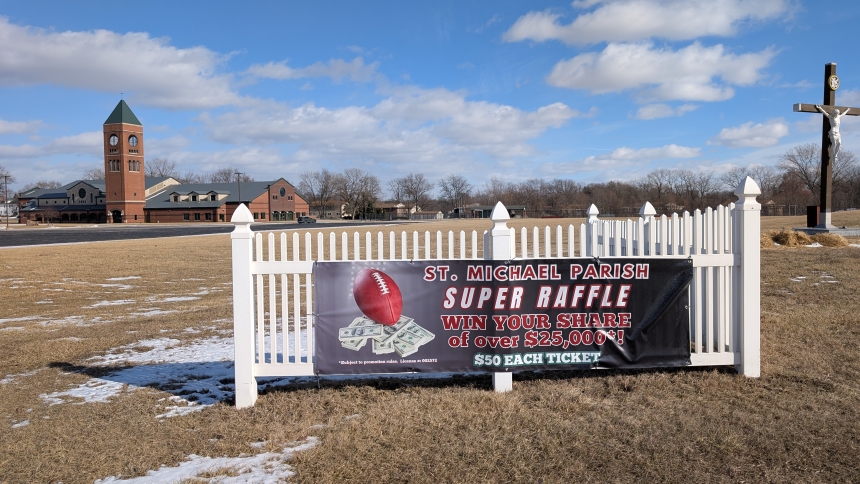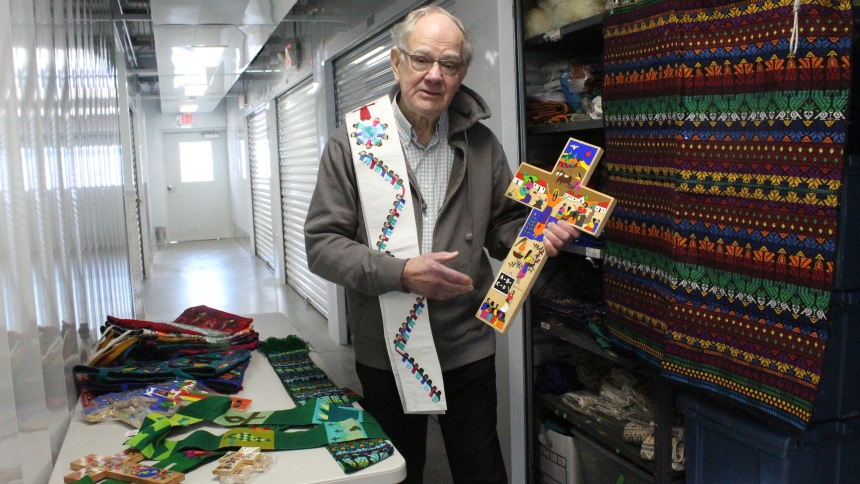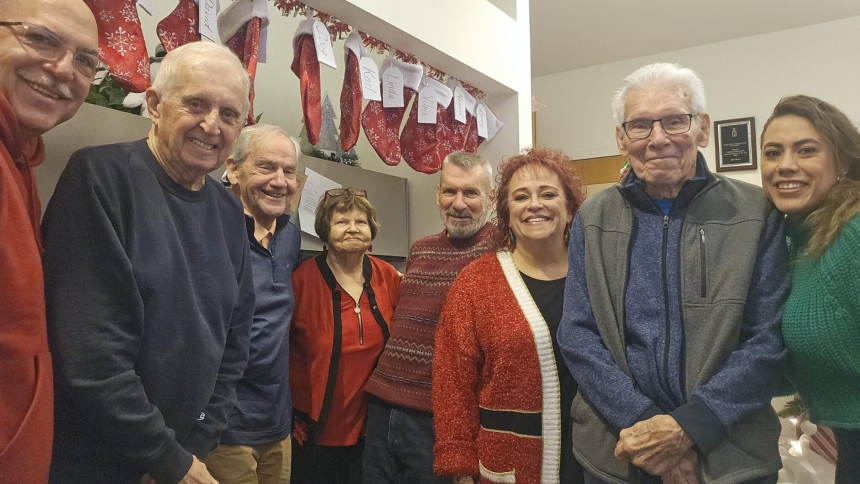
MERRILLVILLE – Following a year that called on parishes to analyze their strengths and weaknesses as part of Synod 2022, members of the Diocesan Pastoral Council gathered on Feb. 4 at Our Lady of Consolation to further assist Bishop Robert J. McClory in efforts to create a culture of missionary discipleship and foster deeper relationships with Christ within the Diocese of Gary.
The meeting began with a celebration of Mass. During the homily, Bishop McClory explained that the two-fold identity of being both a disciple and a missionary is the template through which the diocese has sought to engage in various planning activities.
Bishop McClory acknowledged that when people engage in planning, they often measure their productivity by listing all the things they are doing. While those things can be important, the bishop cautioned that in addition to activity, “There needs to be a time to rest, to be renewed and to be nourished – particularly spending time in prayer with our Lord.” He encouraged the faithful to be “human beings,” resting in the presence of God, along with being “human doers.”
Opening the meeting, Father Christopher Stanish, vicar general and moderator of the curia, said the diocese has spent time in prayer and discernment with the Lord throughout the synod process. Having participated in its own synod in 2017, which resulted in the formation of eight ecclesial areas for the diocese to address, Bishop McClory accepted Pope Francis' invitation for all churches to participate in a global Synod 2022. “Now we can really focus that on missionary discipleship,” he noted.
Each parish and its leadership team was asked by Bishop McClory to create a synod action plan last year. Father Stanish reported that 48 out of 59 parishes within the diocese have completed their formal synod plans. Two requested extensions and a few are transitioning with new pastors.
“Honestly, this is a great percentage,” he said. “I would love for it to be 100%, but where we are at today – a lot of our parishes, a lot of pastors, and a lot of our communities within the Diocese of Gary are really looking toward the future.”
Father Stanish detailed how the information from the parishes was synthesized to create a list of key themes, including evangelization and discipleship; formation and education; youth and young adults; liturgy, spirituality and worship; hospitality; marriage and family; leadership development; and outreach and social justice.
These themes led to the development of goals that included engaging youth, strengthening faith formation, forming small faith communities, and enlivening the Sunday experience.
“As communities grow, one thing people often say is that they feel less known or less seen. There’s a very common phrase that says, ‘The Church grows small,’” said Father Stanish. “What is meant by that is this goal of forming small group faith communities, being able to have a small group of 6 to 8 people where you feel known and loved and cared for. It’s through that, that you grow in your faith, in your own development with the Lord.”
Father Stanish noted the ongoing effort for greater overall communication and clarity within the diocese, stating, “As much as we think we are communicating a lot, there is still a need for greater communication.” He added the Diocese of Gary’s Communications Department is working on initiatives to strengthen communication among parishes.
Father Stanish also had the pleasure of announcing that as a result of Synod 2022, the diocese is offering more than $100,000 in grants for parishes who have turned in their synod action plans. Applications are currently open, with the monies to be dispersed throughout Lent so those programs can begin quickly. To learn more about the grants, he added, contact Sean Martin in the diocesan Office of Evangelization, Catechesis and Family Life.
“We are allowing a lot of money to go out to support your goals of missionary discipleship, and in that way support your efforts in evangelization,” he said to parish representatives.
During a small group discussion, facilitator Father Kevin Huber, diocesan chancellor and pastor of St. Mary, Crown Point, proposed two questions: “Following up on the synod, what is going on in your parish regarding being disciples and being missionaries?”and “What more can diocesan leaders do to support what is going on in your parish?”
Members of the pastoral council heard about the positive programs taking place at parishes and the challenges they face as representatives from each table summed up the group discussions.
James Bilder of St. Paul in Valparaiso said his church in Porter County has been pleased with the recent coordination of its ministries.
"For instance, because of the shortage in numbers, we did some cross pollination. The men's club will now help the Knights of Columbus with its Tootsie Roll Drive and the Knights will help the men's club with something else," he said
Fred Vasquez of St. Mary in East Chicago said his parish in north Lake County had to allow time for new leadership to become familiar with the local area, but remains active through its food pantry, bible study and by making citizenship classes available.
"It's been coming along slowly, but we are still taking steps toward action," he said
“It’s a unified effort,” said Father Huber after all groups had a chance to speak. “Knowing that we go from San Pierre all the way to Whiting – that’s the span of the diocese – is a powerful representation. It’s very helpful for us to know what you have going on.”
Father Huber also gave an update on the National Eucharist Revival, a three-year initiative by the United States Conference of Catholic Bishops to foster devotion to the presence of Christ in the Eucharist. During the 2022-23 program year, the initiative targeted the diocesan level of the Catholic Church, prompting the Diocese of Gary to host a Eucharistic Procession last June. This year, members of the diocese are invited to a Family Conference Day scheduled for Aug. 26. The revival will culminate with the National Eucharistic Congress, July 17-21, 2024, in Indianapolis.
“We are going to take some quiet time to reflect and just see,” said Bishop McClory, referring to the day’s discussions. “We are going to allow that wind of the Holy Spirit to come so it’s not all us – (reflecting) that it really is the Lord steering us as we set our sail to the course that lies before us.”
Bishop McClory also reiterated his commitment to visit each parish and took a moment to publicly acknowledge what he called “the extraordinary contributions” of the late Bishop Donald J. Melczek, “to which we are all successors and beneficiaries.”



